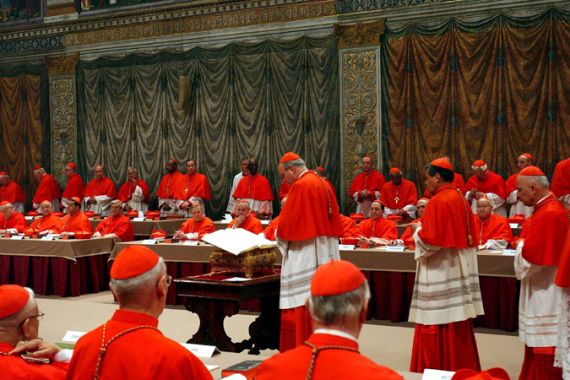Indonesian cardinal to miss papal election
Announcement comes as Benedict XVI considers changing rules governing conclave to fast track election of his successor.

The head of Indonesia’s Catholic church has announced that he will not participate in the election of the next pope, citing his ailing health.
Cardinal Julius Riyadi Darmaatmadja, 78, told Hidup Katolik, an Indonesian Catholic magazine, that his eyesight was failing and that he would not be able to handle reading the “texts, materials, rules, and so on” necessary for the event.
“My strength had deteriorated, my ability to read weakened. Those tasks require strength, speed and agility,” he said.
“I ask forgiveness from the Catholic Church of Indonesia, that I cannot represent [the country] in this very important event.”
Darmaatmadja’s decision brings down to 116 the number of cardinals below the age of 80, who are qualified to vote for the successor of Pope Benedict XVI.
Benedict is scheduled to officially resign on February 28 at 19:00 GMT.
Earlier in the week, the Vatican said the pope may change rules governing the conclave that will secretly elect his successor, a decision that could fast track the meeting of cardinals in Rome.
Father Federico Lombardi, the Vatican spokesman, said on Wednesday that Benedict was considering issuing a “Motu Proprio,” a personal document, which has the force of church law, in regards to the changes.
The rule changes could mean that the conclave could start before March 15, which is currently the earliest it can begin.
The Vatican appears to be aiming to have a new pope installed before Palm Sunday on March 24, so he can preside at Holy Week services leading to Easter on March 31.
Turf advantage
Some in the church believe that an early conclave would give an unfair advantage to cardinals already in Rome and
working in the Curia, the Vatican’s central administration.
“A short period before a conclave helps the curial cardinals in Rome operating on their home turf,” said Father Tom Reese, an expert at Georgetown University and author of several books on the Vatican.
“The longer the pre-conclave period, the more time non-curial cardinals have to talk to each other and to get to know each other.
“The longer the period prior to the conclave, the less dependent outside cardinals are on the curial cardinals.”
During the conclave, cardinals are not allowed to communicate in any way with the outside world, nor are they allowed to listen to radio, watch television, make phone calls or use the internet.
Benedict has hand-picked more than half the men who will elect his successor. The rest were chosen by the late Pope John Paul II.
A number of cardinals have said they would be open to the possibility of a pope from the developing world.
“I can imagine taking a step towards a black pope, an African pope or a Latin American pope,” Cardinal Kurt Koch, a Swiss Vatican official, told the Reuters news agency in an interview last week.
Of the 116 electors left, 61 are from Europe. Italy, the largest national group, will have 28 cardinals, up from 20 at the last conclave in 2005.